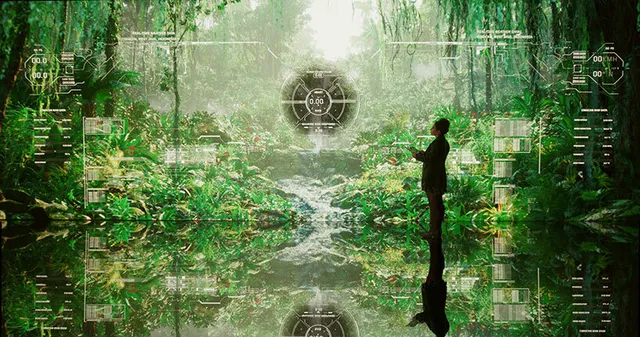
Matthew B
- Research Program Mentor
MFA at Rhode Island School of Design
Expertise
Graphic design, data science, sustainability, participatory design, information design, sound design, film making, photography, creative writing, user experience design
Bio
I’m a multidisciplinary designer, musician, and researcher passionate about ecology, landscape, and sustainability. My work explores creative and participatory ways of sensing, mapping, and understanding complex environmental systems—combining data with personal stories, lived experiences, and the wisdom of place. I especially love working with students who want to blur the lines between art, science, and design—whether through storytelling, data-driven projects, or hands-on experiments rooted in the local environment. I believe that meaningful change often comes from listening deeply: to the land, to marginalized voices, and to the more-than-human world—animals, plants, and ecosystems with stories of their own to tell. If you're someone who’s curious, collaborative, and excited about using your creativity to imagine more just and sustainable futures, I’d love to work with you. I am a part-time Professor at Rhode Island School of Design (RISD) and Northeastern University where I teach in regenerative design and storytelling, including skills like sound design, graphic design, photography, film making, data science, and creative writing. I am also an AI for Sustainability Transformations Fellow at Transformations Community. I was mentored in sound design and music production by Bradley Zero, founder of London-based Rhythm Section International and DJ at NTS Radio. I am an active member of ETH Zurich’s Designing Resilient Regenerative Systems group, TB21–Academy’s Ocean/UNI, and the Yale Forest Forum. On the side, I makes music, visual art, and photographs. I love movement and the outdoors and you will most likely find me playing tennis, running, doing yoga, hiking, or sailing.Project ideas
Storytelling for Impact: Create a Podcast, Song, or Soundscape
In this project we will create an audio podcast for a social impact cause of your choice. The theme could be, for example, ocean conservation, land use, food, heritage, fashion, or cultural memory. After researching the issue extensively, you will then express you own viewpoint through the medium of sound. You will learn how to weave elements such as voice, environmental sounds, and music together to create an emotional and immersive narrative soundscape. The end result could be a sound story or podcast series which inspires action and awareness around your selected sustainability theme.
Storytelling for Impact: Data Visualization
In this project we will create a custom information design for a social impact cause of your choice. After researching the issue extensively, you will then express you own viewpoint through the format of information design. This will challenge you to portray complex information clearly and creatively to an intended audience. We will source appropriate data, analyze it, storyboard visualization concepts, and develop a custom information graphic or a series of them. The end result could be a digital image or poster which inspires action and awareness around your selected sustainability theme. We will also discuss themes like "greenwashing" and how to avoid it.
Storytelling for Impact: Photography Website or Photo series
Through this project you will create a custom photo series for a social impact cause. First pick a local or global sustainability issue that is focused on sustainability and impact. After researching the issue extensively, you will then learn to express you own viewpoint through the medium of photography. Through this project we will discuss strategies for photographic research, developing a strong concept, shooting tips, image composition, and image editing. The end result could be a digital or printed photographic series which inspires action and awareness around your selected sustainability theme.
Research Paper: Applying Systemic Design to Complex Social Challenges
In this assignment, you will write a research paper that explores the principles and practices of systemic design or systems thinking and applies them to a real-world context of your choice—such as food systems, climate resilience, urban housing, education, or public health. Your paper should begin by introducing the foundations of systemic design: What is it? How does it differ from traditional design approaches? What methodologies, tools, or frameworks are commonly used (e.g., systems mapping, feedback loops, leverage points, stakeholder analysis, etc.)? Next, you will select a specific context or challenge and examine how systemic design can be used to better understand, intervene in, or transform this issue. This could include: Mapping the actors, relationships, and dynamics involved Identifying patterns, unintended consequences, or power imbalances Locating possible points of intervention or transformation Reflecting on the ethical, social, and ecological implications of your analysis The goal of this paper is not to offer a single solution, but to demonstrate systems literacy and explore the complexity of real-world problems through a systemic lens. Use diagrams, case studies, and citations to support your analysis. Your paper should include: An introduction to systemic design and key concepts A clearly defined issue/context (e.g., global food waste, regenerative agriculture, housing justice) An application of systemic thinking to that context Visuals (systems map, causal loop diagram, etc.) to illustrate complexity A reflection on what was revealed through this process, including challenges or insights Proper citations of sources and frameworks



